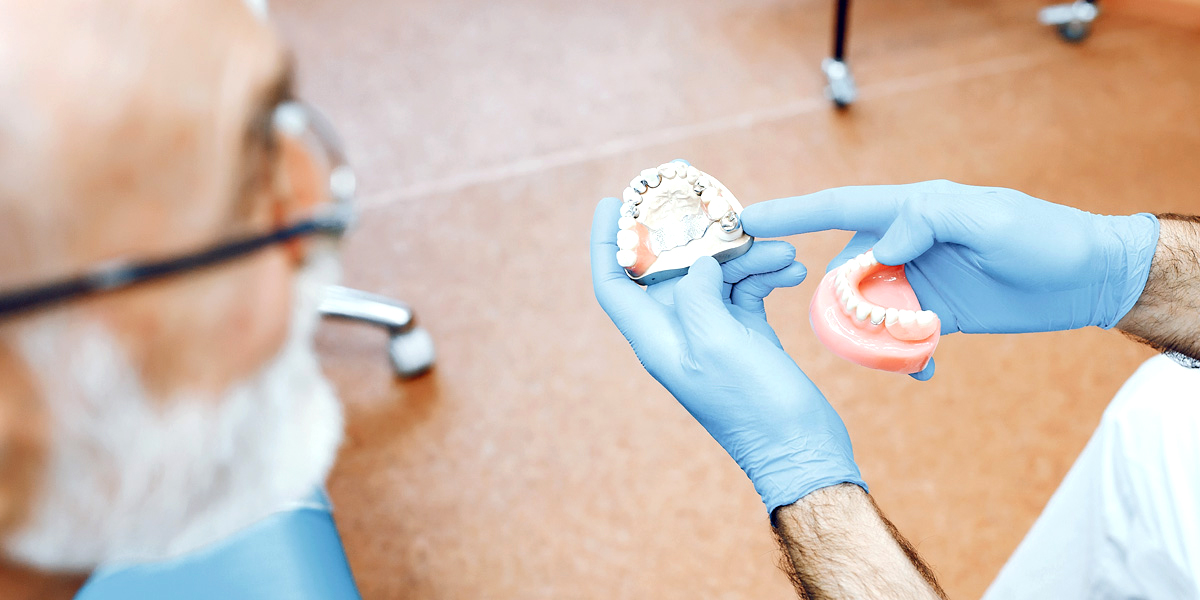In this article we explain the possible discomforts that can arise after the fitting of new dentures, and offer some tips for a good adaptation.
Dental prostheses are medical devices designed to restore or improve certain abilities that have been lost as a result of edentulism or loss of teeth. Amongst the benefits we can highlight the restoration or improvement of adequately chewing food, assist in the improvement of speech due to the restoration of the ability to articulate phonemes and contribute to restoring a more natural and youthful appearance to the face.
All these improvements have an undeniable positive impact. Firstly, on health, the prostheses make it possible to maintain a normal diet, avoiding the need for a soft diet. Secondly, the improvement of mood, as the absence of teeth can contribute to social withdrawal due to feelings of embarrassment because of difficulty in speaking or having to show one’s smile.
However, we must bear in mind that there is a period of adaptation in which discomfort or a feeling of discomfort may occur. No matter how well-made they are, prostheses represent a foreign body in the mouth, so it takes time to assimilate them i.e. to stop noticing them. Therefore, it is possible that during the first few days there may be some temporary discomfort which will subside as the days go by.
Frequent discomfort in patients with dentures
One of the most frequent changes is an increase in saliva production due to the so-called ‘candy effect’, because our brain thinks that the prosthesis is a foreign body that must be expelled.
In addition, there may be alterations in the sense of taste, especially in the case of upper prostheses that cover the palate, as this alters our brain’s ability to ‘understand’ flavours.
It is also common to suffer some discomfort in speech, as the tongue, lips and cheeks must learn to articulate words with the new teeth, and this requires a period of adaptation.
Occasionally, some patients may also experience a feeling of nausea, due to the contact of the tongue with the new parts of the dentures, but it is important to understand that this is a temporary condition.
There may be some sensations of pain during the first few days. The prostheses only settle in the gums through use until they find their final position, a process during which sore spots may appear and require some adjustments after fitting.
Once the follow-up visits are over, we at Lura Care recommend that our patients have general check-ups of the dentures every six months. During these check-ups, we monitor the adaptation process and assess the need for realignment to adapt the prostheses to the slow and progressive change in the mouth.
The importance of an adequate diet
With the adjustments of the dental prostheses themselves, it is essential to follow an adequate diet for an optimal adaptation period. At Lura Care we recommend our patients, for the first two or three days, follow a light diet with liquid and semi-liquid foods, such as broth, milkshakes or purees.
Over the next few days, until the sixth or seventh day, they can switch to a diet with soft foods, such as minced meat or boiled vegetables. After this period, a normal and complete diet can be followed.
We must not forget to mention the importance of a healthy and balanced diet for the general health and that of our mouth and teeth. The basis of the diet should be the proteins found in foods such as meat, fish and eggs; the vitamins we can obtain from fresh fruit and vegetables, and the minerals present in dairy products such as milk, cheese and yoghurts.
The fundamental role of support
During the process of adapting to dentures, especially in elderly or dependent people, the support of family members and caregivers is essential. Older people often face additional challenges, such as the need for constant supervision to ensure that they follow dietary recommendations and attend necessary check-ups.
In addition, caring for older people involves providing emotional support to enable them to cope more confidently with this period of change. This support not only facilitates the integration of prostheses into their daily lives, but also enhances their overall well-being, improving both their quality of life and their mood.
From Lura Care we recommend following this series of simple tips for a good adaptation to dentures, which will contribute greatly to making it easier to enjoy them as soon as possible, and to do so for a long time.

